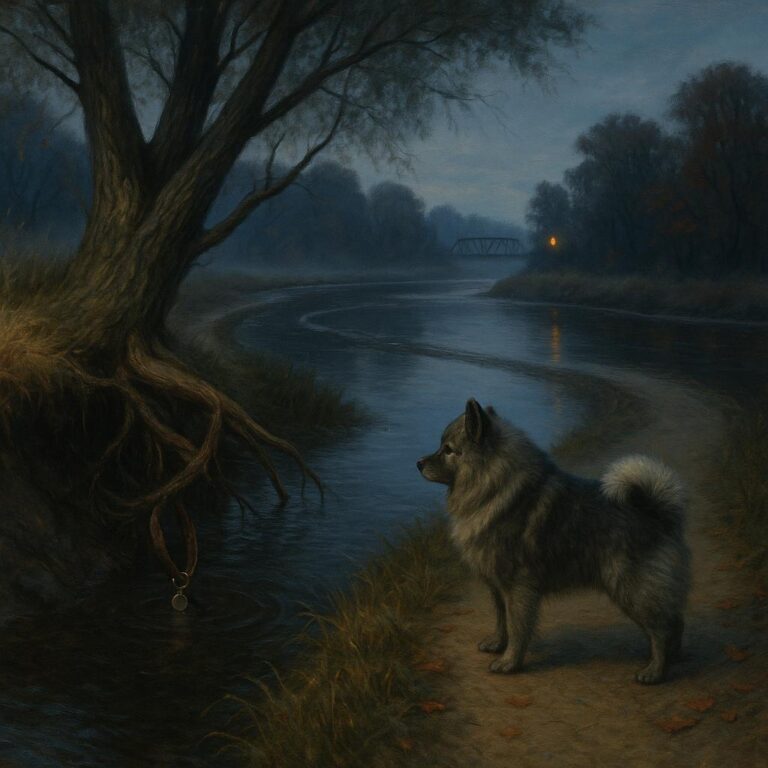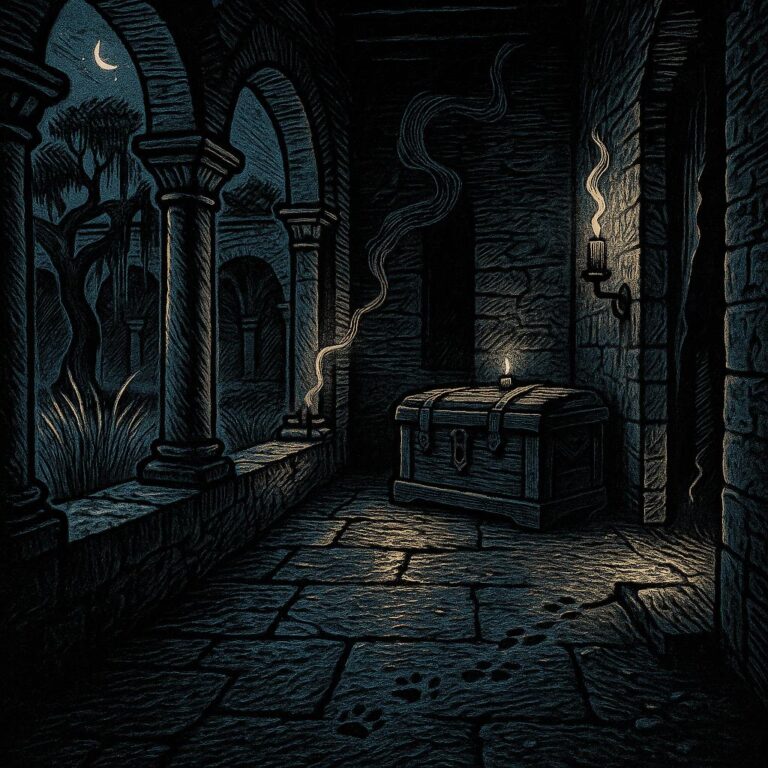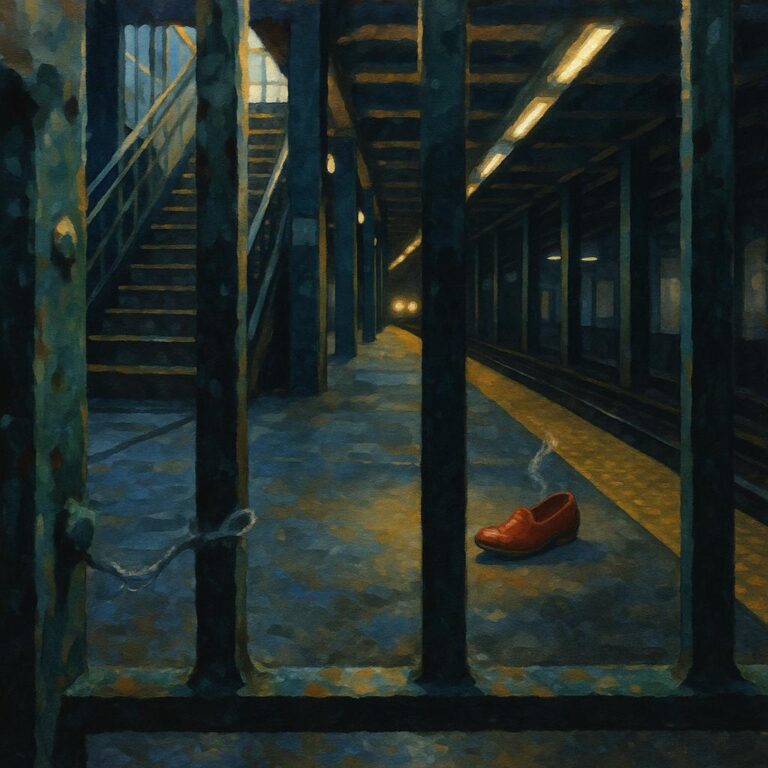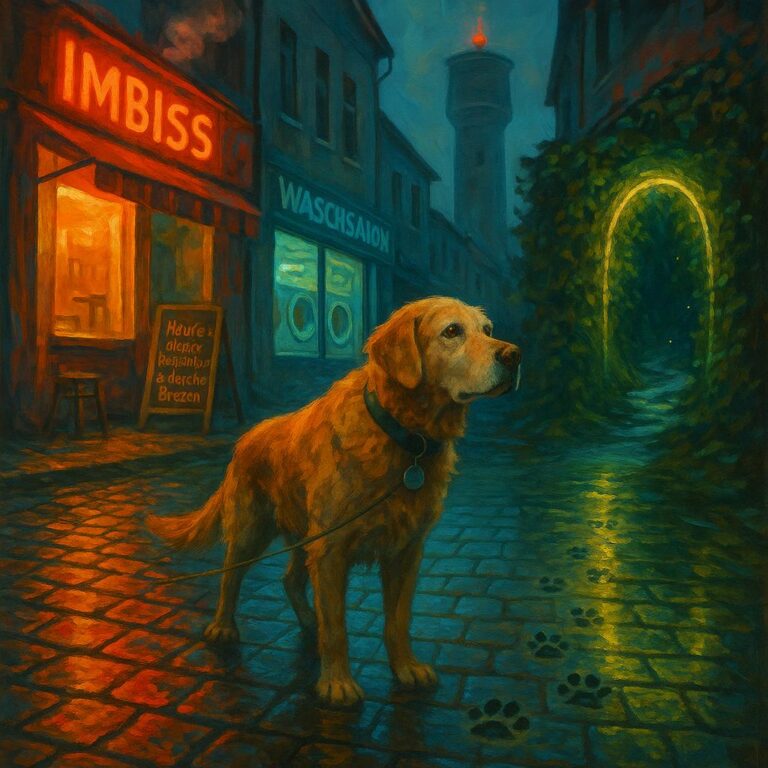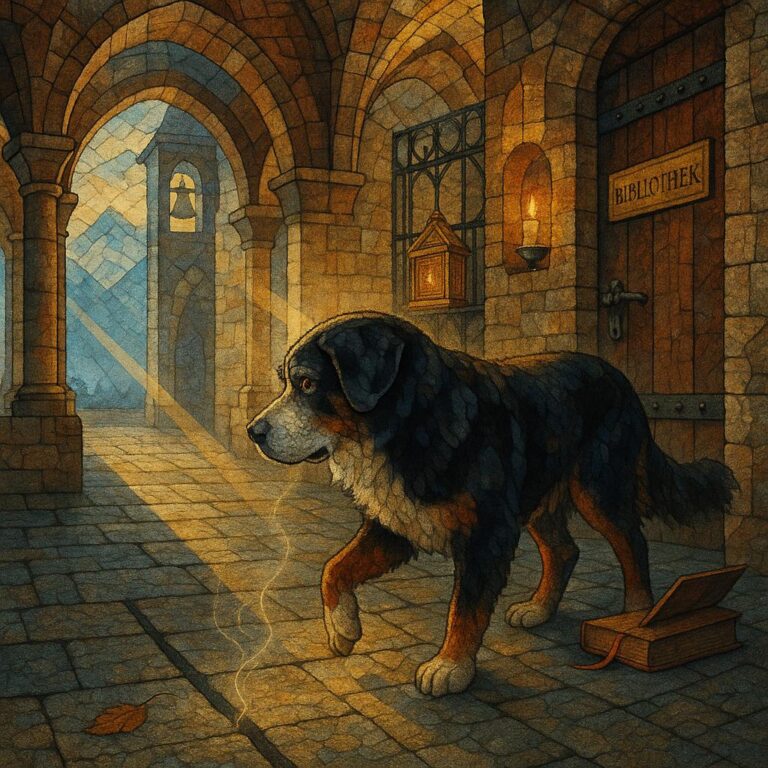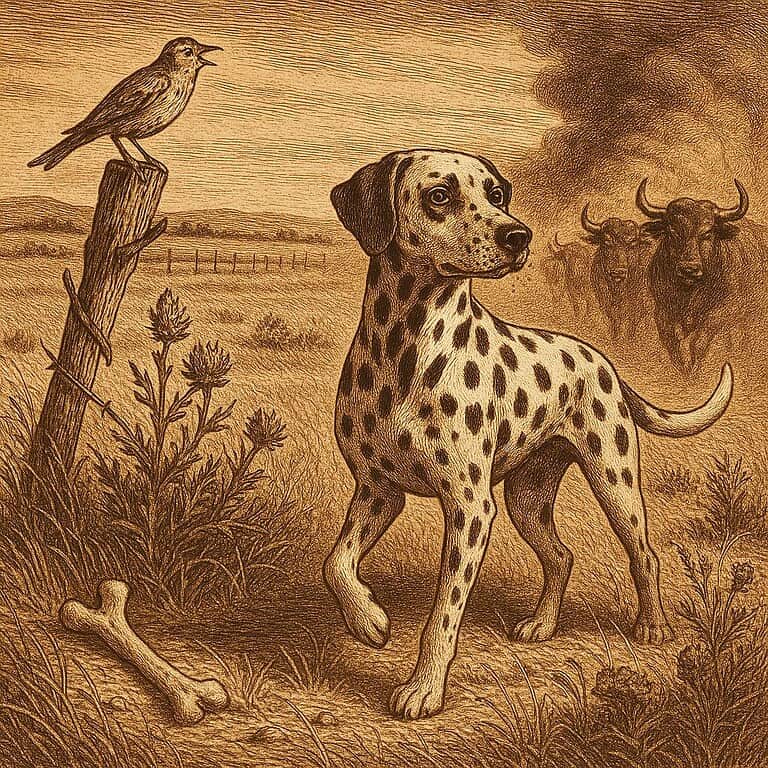The Name in the Water

A hush rolled off the lake, and Moro, a fourteen-year-old Maremma Sheepdog, paused at the black edge of the water. He tasted metal on the breeze, old coins and rain. The small pier creaked like slow breathing. He remembered lambs and bells, then the bell came again, from under the surface. He edged closer, paws cold, watching rings shiver outward like tracks. A pale shape drifted up, trailing weeds. It was a collar. His collar, the brass tag glinting his name. The tag turned, spelling a second word he did not know. As he leaned to read, something tugged below.
He did not back away. The tug was not hard, not a yank, but the old pressure of a lead in a trusted hand. He went forward and the boards slicked under his pads, his nails scritched, and then the lake took him.
Cold climbed his legs like ivy. The black water pressed its soft face to his and breathed into his ears. He held his mouth shut and kept his eyes open, because he had learned that once, in the winter when the canal broke its skin and a ewe went down, you look, you do not guess. The pale loop wavered just ahead, caught on a nail that had grown a beard of green. Weeds combed his chest and made slow hands of themselves around his hind legs. The brass tag tapped his teeth, a little sound that was almost a bell, and the smell of the metal came up through the roof of his mouth and down into whatever part of him still remembered kitchens and knives and mornings when someone said his name before the sun.
He hooked the leather with the side of his jaw and pushed, then drew back fast. Something gave from the dark below, not the nail but a length of rotten strap, and an old knot slid free. He kicked, strong as he could be now, and rose through his own bubbles, the tag beating a steady tick against his tooth.
The pier came up under his paws. Wood groaned like a chest at rest. He threw the water from his fur in a bright arc that smelled of fish and twigs and the tin-coin scent of the lake, and for a breath it was raining in two places at once.
The collar lay on the boards beside him, pale, empty, a circle with a bite taken out of time. He nosed it. The tag was his tag, scratched with his name in the shapes he knew because a child’s finger had once traced them while saying them, laughing, making his ears hot with affection. Besides his name was the other set of shapes, the second word that had seemed to turn itself away from him in the water. He pressed his tongue to the cold and tasted soap and hands and a dab of oil, and the word pricked behind his eyes like a burr you couldn’t reach. He had heard many words. Sit. Stay. Come. Hush. Basta. Bravo. Avanti. This one he did not know. It made no picture in his head. It made a direction in his legs.
He took the collar in his mouth. The leather was swollen and old and tasted faintly of himself long ago. He stepped off the pier and found earth, real earth, the shore that had taken his prints for fourteen years. He moved. He did not hurry. The word moved him.
The path had changed and had not. Stones he had rounded with his shoulder for half a life were still themselves, wearing the polished thumbprint of his passing. Nettles remembered him and brushed him kindly, dusting the whiter hairs along his ribs. He passed the bay tree where the cat had watched him from a high branch on the worktooth days of summer, tail ticking, and the old tractor that had once slept under a skin of lambswool when the storm came wrong. The lake whispered behind. The fish jumped once, twice, like small thoughts.
When the slope began, his hips told him the truth of the years but his feet remembered the exact rise and fall. To his left, the shadowed rows where tomatoes used to burn their scent into the noon lay in their winter shabbiness, twine loosening, posts leaning like tired men. To his right, the low wall that had held warm boys, the one with the notch where his upper teeth had set after a thrown bone, still held the notch. He set his teeth there again, lightly, just to see.
Lanolin came to him, thin, a ghost of itself, and he lifted his head to get it. In the shallow bowl between two hills the flock had slept. He saw them, or the air made him see them—the puffed backs, the milk damp around mouths, the eyes that always looked past him and saw his edges anyway. Bells had been strung with felt so they would not ring at night, but they had rung anyway in his dreams. The bell now was smaller than a church and louder than the lake, and it was inside him, knocking.
He crossed the yard. The door was a darker rectangle in the dark. The bench with the chewed corner was less a bench than a memory of someone waiting on it, rubbing a thumb over the tag while he leaned against knees, nosing pockets for a fig. The stone step was cool, and it was where he had sprawled in July, belly to the wind, while swallows scissored the blue into strips. He laid the collar there and set a paw on it.
The second word sat up in the brass and looked at him. He brought his head close and breathed. He did not remember ever hearing anyone say it. He knew what it wanted.
He carried the collar once more, into the small yard where the grass grew longer because it was nobody’s job to make it shorter. He circled like a thought finding its bed. He circled again, because the joints liked the rhythm of it, because there were two or three places where you lay and only you knew them. When he went down, he went careful, forepaws flat, shoulders lowering, chin resting finally on the tag so that it ticked his tooth one last time.
The bell on the hillside, wherever it was, was not under water now. It had come up with him. It lived in a throat remembered. A voice had once matched it. Moro, said the voice, from a place near his ear where breath warms the skin. Moro. The hand had scratched the back of his neck and made his back kick, and sometimes—on nights when foxes tried the fence—the voice had said, Enough. It had felt like relief around the heart, that word. Enough for now. You did well. Sleep.
Wind went over him and smelled of rosemary and vinegar and wool grease and wet stone. The lake behind the house took the moon and made it smaller and brighter and broke it into a thousand pieces until it was only light.
He did not find the meaning of the second word in letters. It arrived in his body the way thunder arrives in a barn, a softness that is also weight. He understood it the way he understood tracks: with his shoulders, with the soles of his feet. It wanted him to do a simple thing he had been teaching himself not to do for fourteen years.
Return.
He let his eyes go to the gate, to the gap where the latch had rubbed bright. He let his ears turn toward the hill and then back again, because there were no lambs out now, because the foxes would go the long way around this yard forever. He let the part of himself that counted and recounted and snuffed and stood and stood feel how quiet it was in the place he used to bring his worrying back to at dawn.
He breathed the damp out of the tag. He swallowed the taste of brass and soap. His name was there and the other word was there, but neither one needed saying. He made himself heavy into the stone. He closed his mouth the way he had in the water, not against anything, just to keep the small bell still.
When the first birds began their thin stitching, blue loosening from black at the edge of the flat part of the world, the lake’s hush rolled past the yard and down into the hollow where the flock used to sleep. It went on without him.
He had done what was asked of him. He had brought the collar home. He had come back to the place where the bells could ring without him listening. He lay with his nose to the cool brass and let the word have him. He did the thing he had been asked and never quite permitted.
He returned.

